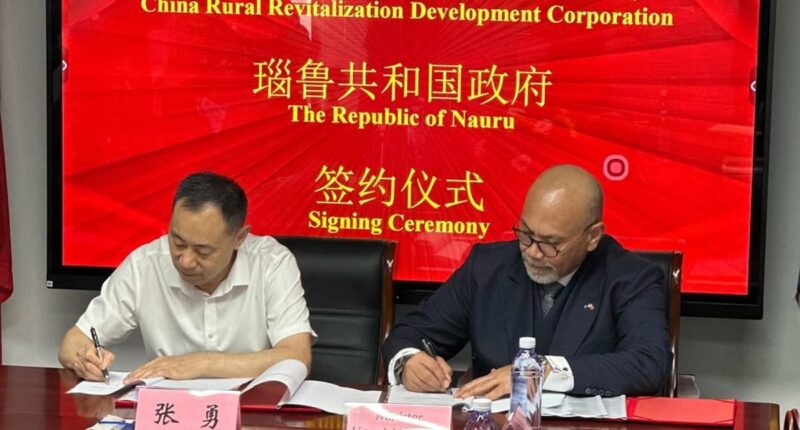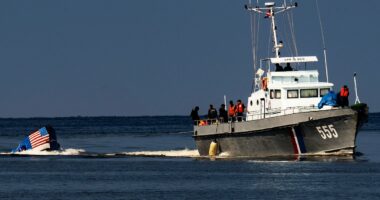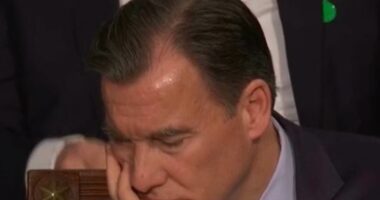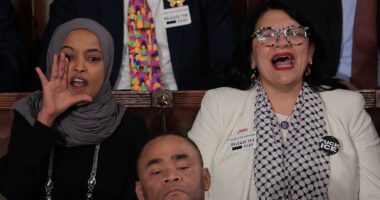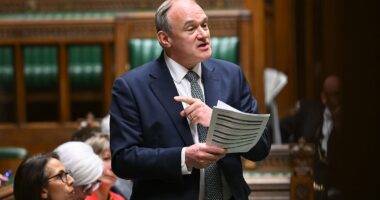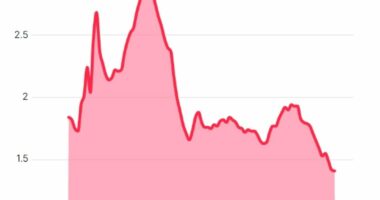Share this @internewscast.com
Australia is working to confirm whether Nauru has breached a security treaty following a $1billion announcement with a Chinese company.
Nauru must have Australia’s approval on any security-related partnerships, arrangements, or engagements with other nations, encompassing sectors such as banking and telecommunications infrastructure.
According to the treaty signed in December 2024, Australia would support Nauru’s banking industry, offer $100 million in budget assistance, and contribute $40 million towards policing, granting Australia a significant influence over other security agreements.
Pacific Minister Pat Conroy noted that the Australian government was collaborating with Nauru to assess whether a development agreement with the China Rural Revitalisation and Development Corporation, undertaken on August 5, triggers treaty obligations.
‘That is a really important treaty for us, that helps position us as a security partner of choice with Nauru,’ Mr Conroy said in Brisbane on Tuesday.
The initial phase of the agreement with the Chinese corporation focuses on renewable energy, the phosphate sector, marine fisheries, and maritime infrastructure.
Mr Conroy said Australia wasn’t opposed to development and economic assistance from other nations in the Pacific.
‘We think other countries should be doing their fair share and investing in the Pacific. That’s a good thing for the region,’ he said.

On August 11, Nauru’s Minister for Foreign Affairs and Trade Lionel Aingimea (featured right) and the chairman of the China Rural Revitalisation and Development Corporation Zhang Yong (featured left) finalized an agreement valued at around AU$1 billion.
‘We’ve consistently emphasized that every nation globally should honor the perspectives of the Pacific Islands Forum and the leaders’ consensus, which posits that security should be catered to by countries within the PIF.’
Mr Conroy has stated China should play no security role in the Pacific.
The jostling for influence between China and traditional partners like Australia in the Pacific has also been on display ahead of the Pacific Islands Forum leaders meeting in the Solomon Islands in September.
Prime Minister Jeremiah Manele has banned all development partners from attending after pressure from China to exclude Taiwan from the forum.
The push to exclude Taiwan, which Beijing claims is part of its territory, split Pacific leaders, some of which still recognise Taiwan over China.
Some forum nations and development partners have expressed that any attendance of Chinese officials at forum events is a red line.
It followed an incident at the 2024 leaders meeting in Tonga where the leaders’ communique was altered after China’s Pacific envoy expressed anger at a provision referencing Taiwan.
Mr Conroy said the decision to exclude dialogue partners by the Solomon Islands was ‘unfortunate’.

Nauru must receive Australia’s sign-off on any partnership, arrangement or engagement with a third nation when it comes to security

The island nation is Nauru (pictured) is tiny but strategically important for its location
‘We think that every dialogue partner should have been invited to the PIF… whether that’s China, Taiwan, the United States, United Kingdom, whoever, you name it,’ he said.
‘We think the 1992 status quo, the consensus around dialogue partner engagement should be maintained.’
The invitation of development partners began in 1992 and includes Taiwan.
Australia has been working to shore up its foothold in the Pacific by signing numerous security and defence co-operation treaties, some of which include exclusivity clauses.
The pact with Papua New Guinea precludes any security presence from China.
A defence pact allowing its citizens to serve in the Australian Defence Force is set to be inked at the celebrations for the 50th anniversary of its independence in Port Moresby in September.
But a treaty with Kiribati has been more elusive, with negotiations effectively put on ice by the Maamau government.
Mr Conroy declined to detail the status of the negotiations.
‘We’re engaging with all Pacific island nations on their interests and we’ve made it very clear that we’re open to doing deals, negotiating beneficial arrangements for any Pacific nation that is interested in talking to us,’ he said.
